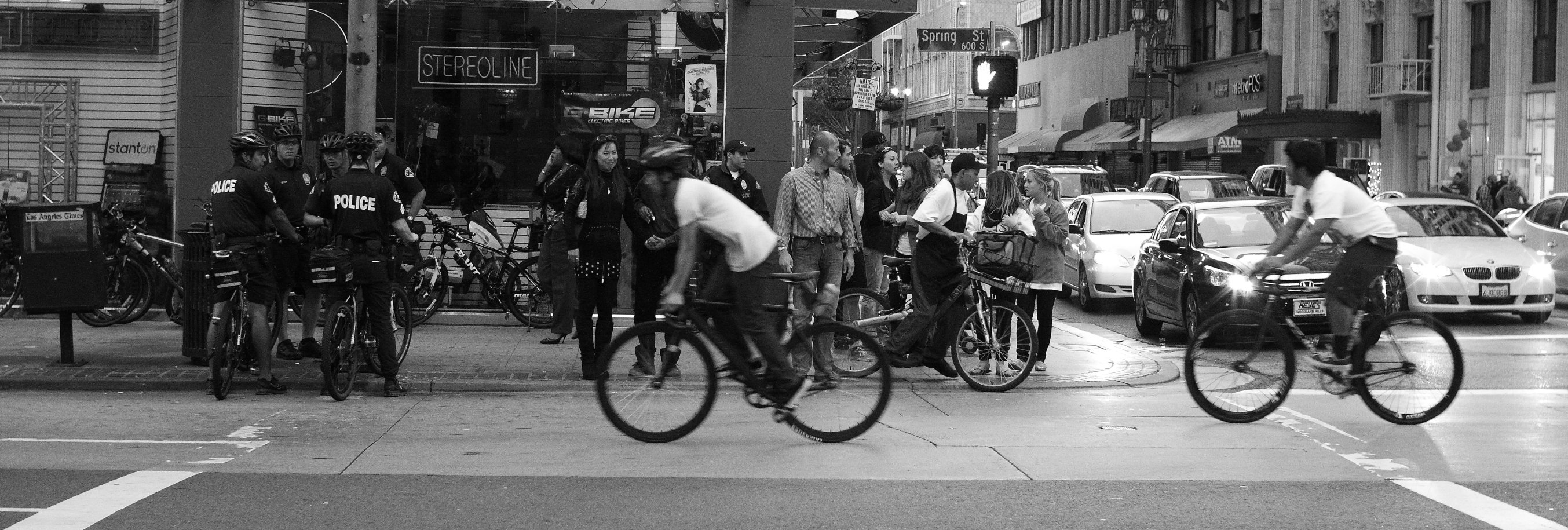Presentations are linked by speaker name below.
Complete Streets/Competing Priorities
The 8th Annual UCLA Downtown Los Angeles Forum on Transportation, Land Use and the Environment
Thursday, May 14, 2015
Keynote lecture from U.S. DOT Secretary Anthony Foxx
As more people are living in cities and making more trips, local governments are presented with an increasingly challenging set of decisions about transportation and mobility. Either from shifting public attitudes or through mandate, cities must plan to accommodate the access and mobility needs of growing populations whilst minimizing the deleterious environmental impacts of transportation infrastructure. Moreover, transportation choices are now seen as vital links to sustainability, economic vitality, and public health objectives. The complexity and urgency of these choices can be seen played out on our city streets, where people in private vehicles, public transit, trucks, and people walking and bicycling must co-exist and compete for space, often dangerously. At this one day event, we will examine these questions and more issues relating to this evolving topic.
Plenary 1: Making concepts concrete: Delivering on your organization’s complete mobility strategies While most agree on complete streets ideas in principle, the number of stakeholders making claims on streetspace is always a challenge. How are cities coordinating planning, operations, and maintenance across such a wide array of functions? This panel kicks the symposium off by reporting on lessons learned from research and practice. 9:00 – 10:30
- Madeline Brozen, Assistant Director, UCLA Institute of Transportation Studies/Lewis Center for Regional Policy Studies (Moderator)
- Stephanie Seskin, Deputy Director, National Complete Streets Coalition
- Francie Stefan, Strategic and Transportation Planning Manager, City of Santa Monica
- Rick Willson, Professor, Cal Poly Pomona
Plenary 2: Beyond talking points: Considering race, class and inequality Concerns about “equity” have moved from the outskirts of complete streets planning to the center in recent months and years. How do we move from concepts of equity to definitions and policies? Small modifications in definitions can lead to vastly different outcomes, and definitions like “benefits a disadvantaged community” are currently up for grabs. How do agencies become more reflective on these issues, and create transportation systems that serve all people, including the poor and communities of color? Speakers in this session will present examples of how they are answering these questions in New Jersey, Oakland, and Los Angeles. 11:00 – 12:30
- Herbie Huff, Research Associate, UCLA Institute of Transportation Studies/Lewis Center for Regional Policy Studies (Moderator)
- Charles Brown, Senior Research Specialist, Alan M. Vorrhees Transportation Center, Rutgers University
- Jamie Parks, Complete Streets Program Manager, City of Oakland
- Jessica Meaney, Managing Director, Investing in Place
Breakout sessions: 2:00 – 3:00
Breakout 1: LOS(t)? Planning in a Post LOS World Discussing what new measures will be required and lessons learned from a city moving forward
- Juan Matute, Associate Director, UCLA Institute of Transportation Studies/Lewis Center for Regional Policy Studies (Moderator)
- Chris Ganson, Senior Planner, California Governor’s Office of Planning and Research
- Mark Yamarone, Transportation Administrator, City of Pasadena
Breakout 2: Safe routes for seniors: pedestrian considerations for an aging society How can cities plan for an increasing population of elderly citizens increases who desire to age in place, and how can complete streets policies complement these goals? We will hear how NYC crafted one of the first programs focusing on “Safe Routes for Seniors” and its possible local application.
- Martin Wachs, Professor Emeritus, Department of Urban Planning, University of California Los Angeles (Moderator)
- Beth Rolandson, Principal Transportation Planner, City of Santa Monica
- Ryan Russo, Deputy Commissioner, New York City Department of Transportation
Breakout 3: Weaving goods movement into complete streets planning How can neighborhoods be places where the economic can be enabled through logistics, while maintaining attractive transportation options for the people living there?
- Jonathan Mason, Lecturer, UCLA Department of Urban Planning (Moderator)
- Craig Williams, Senior Associate, Alta Planning + Design
- Allison Yoh, Transportation Policy Manager, Port of Long Beach
Closing Panel: Talking about revolution: Communicating change In popular media, transportation is discussed from the singular vantage point behind the windshield of private automobiles – congestion is the issue of the day, and all transportation issues center around fixing “traffic.” Meanwhile, city transportation officials work from many perspectives as they consider the needs of all road users. 3:15 – 4:30
- Brian Taylor, Director, UCLA Institute of Transportation Studies/Lewis Center for Regional Policy Studies (Moderator)
- Seleta Reynolds, General Manager, Los Angeles Department of Transportation
- Ryan Russo, Deputy Commissioner, New York City Department of Transportation
- Asha Weinstein Agrawal, Professor, San Jose State University
